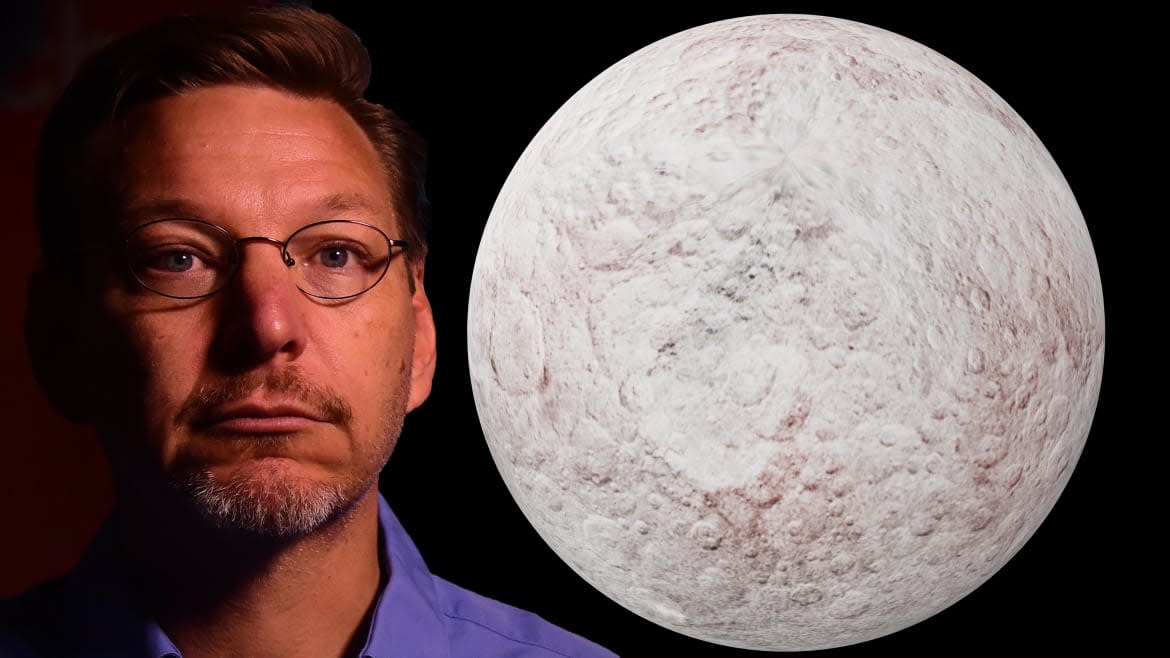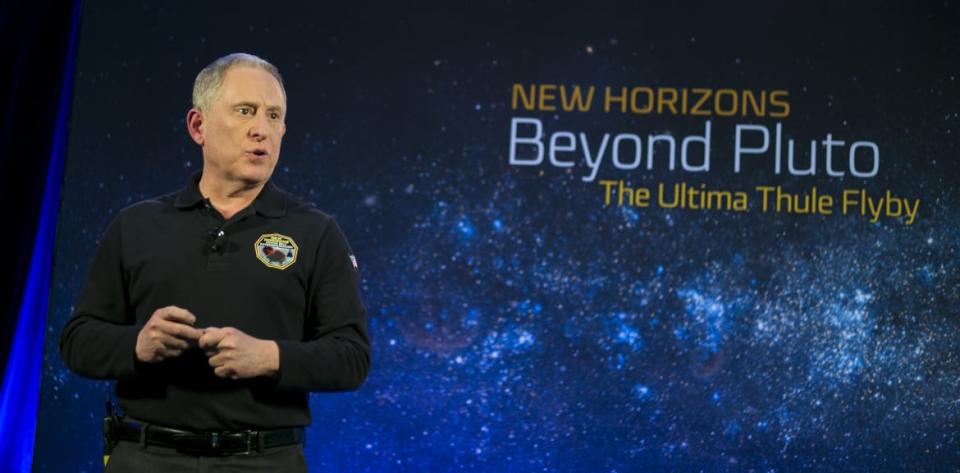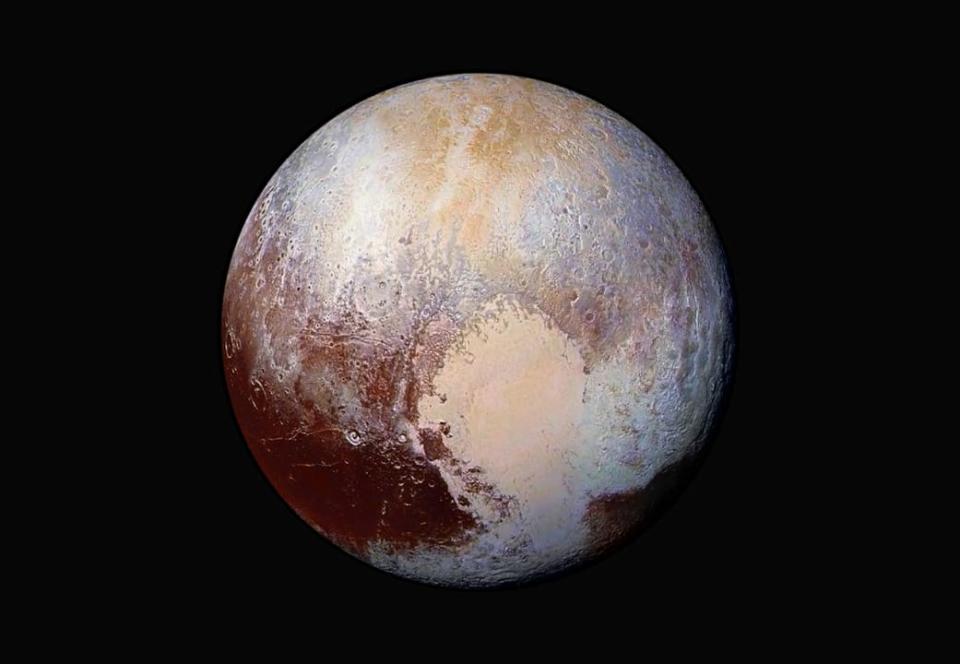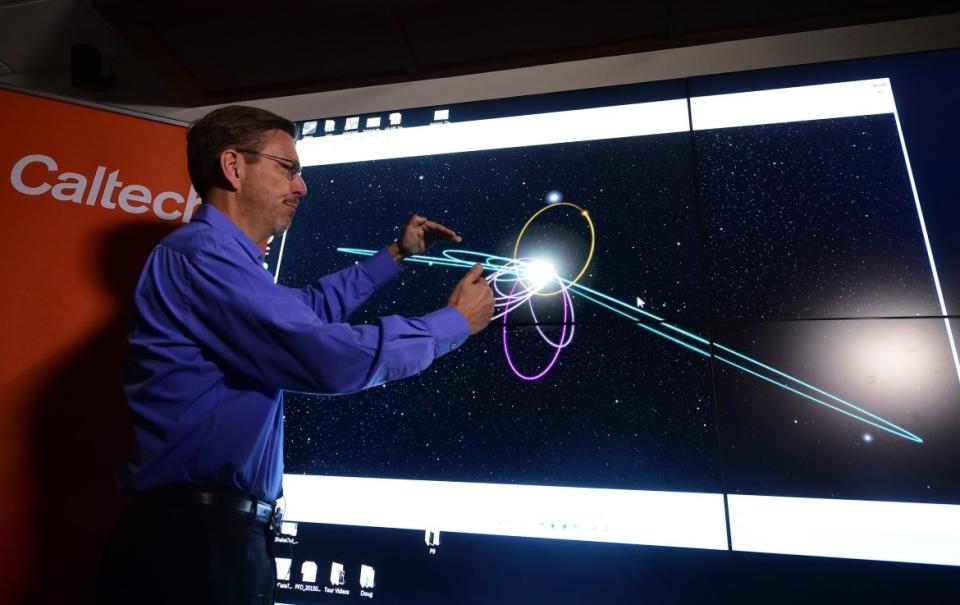Why the Universe Is Annoyed by the Astronomer Pushing a Ninth Planet

It’s one of the most exciting things in the whole field of astronomy: the discovery of a new planet.
But the push to recognize one particular object—an apparent orb many times the size of Earth that seems to be spinning along the outer solar system—as a major planet has been complicated by the history of one earthling.
The scientist championing the naming of a new ninth planet, Caltech astronomer Mike Brown, is the same one who got the old ninth planet, Pluto, removed from the list that teachers teach and students memorize.
Many of Brown’s fellow astronomers are less than thrilled.
To be clear, most of the scientists The Daily Beast spoke with said they like Brown, respect his work and support his efforts to add at least one new planet to the current roster. They just disagree with what he did to Pluto back in 2006. Strongly.
“He’s wrong about Pluto,” planetary scientist Alan Stern, the principal investigator on NASA’s New Horizons mission, which sent a probe past Pluto in 2015, told The Daily Beast.

Alan Stern, the principal investigator on NASA’s New Horizons mission, which sent a probe past Pluto in 2015, says Brown is “just wrong” about the demoted planet.
Fifteen years ago scientists by and large opposed, and later largely ignored, Pluto’s delisting. And they now question many of the assumptions surrounding Brown’s campaign for a new ninth member of Earth’s planetary club.
After all, to them, nothing was wrong with the old ninth planet. Brown’s potential new planet should be at least number 10—if not number 50 or 500. More importantly, they warned, arbitrary bureaucratic meddling in scientific definitions risks doing grave damage.
The Pluto kerfuffle “has actually created a divide between scientists and the public, and sends a terrible message—particularly for these time—that science is done by fiat on the basis of authority,” Mark Sykes, director of the Planetary Science Institute in Arizona, told The Daily Beast.
The current controversy has its roots in a discovery 91 years ago, when astronomers at the Lowell Observatory in Arizona accidentally caught the first glimpse of the object that they would eventually name Pluto. It was very far away (3 billion miles or so), very small (less than a fifth the diameter of Earth) and shrouded in darkness.
It was deemed, uncontroversially at the time, a planet. After all, it was round and fairly smooth, meaning it possessed enough gravity to shape itself, very slowly over billions of years. And it clearly had complex geology. That matched the definition of “planet” that Italian polymath Galileo Galilei came up with nearly 500 years ago and which almost all astronomers agreed on in 1930—and still agree on today.
With Pluto’s discovery, the solar system officially had nine planets: the fairly small inner planets Mercury, Venus, Earth and Mars and, on the other side of a belt of asteroids, the mostly big outer planets Jupiter, Saturn, Uranus and Neptune.
Pluto was the latecomer and outlier, lurking in the darkness of the Kuiper Belt, a ring of comets, asteroids, and ice that’s so vast and so far from the Sun that it’s still mostly a mystery.

The planet Pluto is pictured in a composite of four images from New Horizons' Long Range Reconnaissance Imager in July 2015.
The lineup stayed the same for the next 76 years. Then, in 2005, Brown and his team detected another object in the Kuiper Belt, one that was much bigger than Pluto. NASA initially described this object, which came to be known as “Eris,” as the solar system’s 10th planet.
“After we discovered Eris, and realized that Eris is more massive than Pluto, you’ve got to do something,” Brown told the BBC in July. Rightly suspecting there were more planet-like objects out there in the Kuiper Belt, he appealed to the Paris-based International Astronomical Union, the leading association for astronomers and other planetary scientists, to reconsider the definition of “planet” in order to prevent the accepted list from growing by dozens or more—an expansion Brown at the time described as “ridiculous.”
In August 2006, a small group within the IAU surprised the rest of the union and the world at large when at the end of a weeklong conference in Prague they voted on a hastily drafted proclamation rejecting Pluto’s status as a full planet.
The scientific rank-and-file howled. The new definition of “planet” that the IAU embraced, all in order to boot Pluto off the list and keep Eris off, required that a round body orbit our sun and also use its gravity to clear the space around it of asteroids and other smaller objects.
It was, in the minds of many astronomers, a bizarre definition. For one, it excluded Earth during its messy early eons. It also left out thousands of confirmed “exo-planets” orbiting stars besides our own. (Catherine Cesarsky, who became the IAU’s president just days after the Pluto delisting and spent years defending the decision, did not reply to a request for comment.)
Stern said the IAU wanted to keep the official list of planets in our solar system short so that teachers would have no problem teaching the list, and students would have an easier time memorizing it—a motive he finds “intensely objectionable.”
“Do we have eight states in the United States so schoolchildren don’t have to memorize all 50?” he asked. “Do we limit the number of species?”
As a result of the cursory vote, Pluto became a planetoid rather than a planet, as did Eris. And the grumbling in the wider scientific community began, continuing to this day.
“I think the IAU’s demotion of Pluto was questionable,” Steve Maran, a former NASA astrophysicist, told The Daily Beast.
But Brown approved of the move. “Pluto would never have been called a planet if it were discovered today,” he said in 2010 while promoting his book How I Killed Pluto and Why It Had It Coming.
The new definition of “planet” gave Brown the freedom to assess faraway objects such as Eris without having to argue for their planethood.
“I think that Pluto as an example of a large Kuiper Belt object is so much more interesting than Pluto as this very weird planet at the outer edge of the solar system, unlike anything else,” Brown told Space.com in 2010.
Brown told The Daily Beast recently that he hasn’t changed his mind about Pluto. And he insisted the outrage has subsided. “There are a few loud voices continuing to proclaim that Pluto should still be a planet, but most everyone else has moved on,” he said.
Brown has certainly moved on—to another something spinning along the Kuiper Belt that he thinks is more deserving of planetary status than Pluto.
Working alongside fellow Caltech astronomer Konstantin Batygin, Brown has been tracking asteroids and other denizens of the dark outer edge of our solar system. He and Batygin noticed some of them seeming to cluster around a particular spot in space up to 100 billion miles from Earth.
No planet is visible—it might be too far away and too dark—but the clustering of the smaller, brighter objects could hint at an unseen planet’s gravity. “There is gravitational evidence for it,” Batygin told The Daily Beast. “But the search will not conclude until we have an image in hand.”

Caltech astronomer Mike Brown briefs the media about a potential ninth planet.
If Brown and Batygin can finally get a good look at whatever might be there—perhaps using NASA’s soon-to-launch James Webb Space Telescope—it’s possible they’ll be able to argue for the IAU and other astronomical authorities to recognize a new No. 9. Brown and Batygin’s summary of their initial survey has been accepted for publication in Astronomical Journal.
Brown said he’s confident the discovery will obviously and uncontroversially be a planet. “It would be six times more massive than the Earth and the fifth-largest planet in our solar system,” he explained.
And many scientists agree with Brown that his find could be a planet, even under the IAU’s newly stringent definition. Their complaint is that lots of objects out there in the Kuiper Belt also warrant the label—just like Pluto.
Astronomers never really accepted the IAU’s 2006 redefinition of “planet.” Philip Metzger, a physicist at the University of Central Florida who surveyed the scientific literature for years following the Pluto delisting, discovered that almost all scientists chose to simply ignore the IAU’s proclamation.
But the change did register with the general public. Textbook authors and schools in particular took their cue from the IAU and dropped Pluto from their texts and lessons on the makeup of the solar system.
While Brown seemed to hope that delisting Pluto would free him to explore the complexity of the solar system, it paradoxically had the effect of simplifying the public’s conception of space. And this narrowing focus came at a time when new discoveries, piling up by the month and year, reveal an increasingly bizarre and busy cosmos.
“Because of the IAU, the public is isolated from the excitement of what a mess things are out there!” Sykes said. “The solar system is lousy with planets!”
Brown’s own push for a new ninth planet underscores that reality. The simplified conception of space that prompted Pluto’s downgrade is a kind of strained fiction—one that, to many scientists, seems more implausible by the day.
Get our top stories in your inbox every day. Sign up now!
Daily Beast Membership: Beast Inside goes deeper on the stories that matter to you. Learn more.

